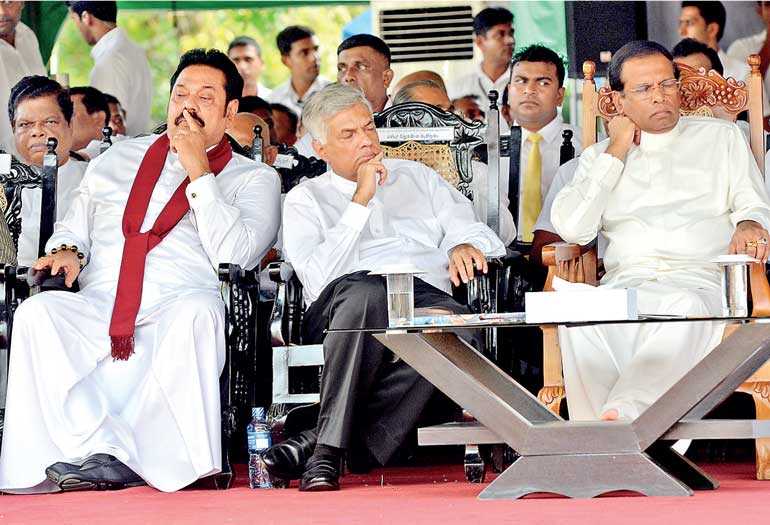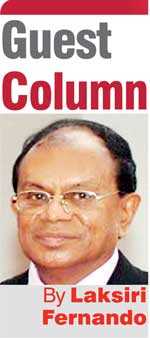Monday Feb 23, 2026
Monday Feb 23, 2026
Tuesday, 1 January 2019 00:00 - - {{hitsCtrl.values.hits}}

How things began
Maithripala Sirisena left Mahinda Rajapaksa four years ago, after a hopper treat, because he was not given due recognition as a Minister, and the PM position. That may be true. Otherwise, he even voted for the 18th Amendment to allow the possibility of Rajapaksa to contest for the presidency again and again without a term-limit. There must have been other reasons to do with family rule or authoritarian handling of things. 
The Lord (the people) took vengeance from Rajapaksa on 8 January 2015, and he left for Medamulana on the same night without a whimper, whatever Mangala Samaraweera said about a military coup. Romans as quoted above were correct about the Lord. That was justice. After another attempt at power as the PM on 26 October, Rajapaksa is again eating humble pie, still waiting to be declared as the Leader of the Opposition. Justice often means punishment, and this time by the Supreme Court.
When Sirisena was elected as the President, to the surprise of many, he was quite amicable to Ranil Wickremesinghe, the schemer behind all the political gimmicks since then, and even called the latter ‘Sir’. However, Ranil apparently didn’t like anyone above him and most certainly a ‘gamarala’ from Polonnaruwa. Most disliked was his continuous and rigmarole Sinhala talk. Sirisena was meekly humble at the beginning, and even gave Temple Trees back to the PM.
Then there was this 100-day program (whoever drafted it!) to clip the presidential powers of anyone above the PM, among other things, and Sirisena was obviously trapped. The only obstacle was the presidential constitution itself which could not be totally changed without people’s consent, a referendum. Therefore, many constitutional jugglery had to be performed, as evident from the 19A. An expert from the left movement was hired for the job, who has some experience in these type of matters.
Naivety and offense
Sirisena was obviously naïve at the beginning. When he realised his predicament, he was rather late. Therefore his anger was doubled, and trebled. This is where what Machiavelli said about ‘offence’ became true. Sirisena was not destroyed, but offended to the brim.
This is not to relate Machiavelli’s advice literally into democratic politics today. Complete destruction of an enemy is not possible today, except in civil war or by punishing someone for criminal offenses. Now Jaliya Wickramasuriya, Mahinda’s first cousin, is trapped in the USA. Similar things might happen in the near future. Otherwise, politicians have to live with perceived enemies, whether they like it or not. Mahinda Rajapaksa (also his gang) is still there with renewed vigour, although slightly bruised after the abortive attempt at unjustified grabbing of the PM position. Sirisena is to be blamed mainly for this tragicomic happening.
There is no question that politicians should be punished for financial fraud and corruption. However, this should be done without bias, and equally for one’s own side, and not merely targeting the opposition. Otherwise, the Lord will be angry. The opposite is what has happened since 2015 and the appointment of Ravi Karunanayake would confirm the situation in the eyes of the people. Whatever said against Sirisena, he relatively appears clean in respect of financial matters (so far!). Although called Mr Clean, Wickremesinghe has become a prime suspect in the bond scam.
Revenging in circles
What has happened since 2015 is revenging in circles, not mere circularity. The reasons are not so byzantine. Politics is understood, or used by politicians as power, and absolute power in the case of some. And power is used for personal interests rather than for public good. Politics should be for justice and public good instead. Sirisena took revenge from Rajapaksa as he was marginalised. Wickremesinghe took revenge from Sirisena as he was not toying his line as anticipated. There were overt or alleged policy differences as well.
The first policy difference between the two was the appointment of Arjuna Mahendran as the Governor to the Central Bank. This reminded Sirisena of old stories about Wickremesinghe – that he is inclined to work with his Royalists. By that time Wickremesinghe has taken over the Central Bank under his wings and was quite determined to control and direct the economy according to his neoliberalism. The obvious immediate result was the Bond Scam.
According to Wickremesinghe ideology, an uncle giving inside information to his nephew is not a big issue. What is important is money to the Treasury. It appears that Wickremesinghe wanted to fudge the situation from the beginning and even Sirisena corroborated by dissolving Parliament in June (2015) before Parliamentary Committee on Public Enterprises (COPE) giving its damning report on the matter. There are so many other people who don’t consider the ‘bond scam’ as a financial fraud or corruption, according to probably their capitalist thinking.
Things soured between the two eventually and much after the general elections of August 2015. Even by that time Sirisena was like a bruised cobra because of the 19th Amendment and other matters. His first major counter attack was the appointment of the Presidential Commission on the Bond Issue in March 2017. Even that was a late reaction. Nevertheless, it was a major turning point of their soured relations. Although the national government marriage continued uneasily even thereafter, it was without a proper direction either from Sirisena or Wickremesinghe.
Overreaction?
Sirisena appears to be a slow, but an over reactor. As he was leading the SLFP, the party’s performance at the local government election was a major setback. He correctly attributed that set back to his alliance with the UNP and its unpopular economic policies. First, without properly assessing the relative strengths between the opposition and the Wickremesinghe Government, he encouraged the aborted no confidence motion in April 2018.
Then came his major reaction on 26 October. He ousted Wickremesinghe, but Wickremesinghe refused to leave Temple Trees or his position as the PM. Now R. Sampanthan is doing a similar adventure without leaving the office of the Leader of the Opposition. What strength did Wickremesinghe get in October even without a clear majority in Parliament? It is not merely the support of the TNA or the JVP that allowed Wickremesinghe to come back to power. Some of the Western embassies and international NGOs were believed to be behind the comeback, not to speak about the local cohorts. Sampanthan might be banking on the same.
More importantly, it was possible because of the miscalculation on the part of Sirisena that Rajapaksa could muster a majority. S. B. Dissanayake was behind all the machinations based on pre-2015 experience of parliamentary politics. It was not purely a constitutional obstacle, but a political one. Whatever the objectives that the people or even Sirisena had in mind in bringing a change of government in January and also in August 2015, Wickremesinghe government probably survived and survives because of the backing of the Western powers.
This backing is premised largely on the objective of preventing Chinese influence in Sri Lanka. It was not by accident that the Chinese Ambassador was the first and also the last to greet Rajapaksa as the new Prime Minister. This created more fears or anxieties on the part of Western embassies.
Overreaction was accompanied by overconfidence on the part of both Sirisena and Rajapaksa. Rajapaksa’s overreaction became more evident by taking the membership of the SLPP, or allegedly applying for it, without considering possible legal ramifications. When Sirisena’s three trump cards of ‘Dismissal, Prorogation and Dissolution’ came one after the other, at a quick pace, the Western educated middle class or the Colombians also became genuinely alarmed. They were thriving under Wickremesinghe economics.
Sirisena’s actions and boasted overconfidence undoubtedly had an element of authoritarianism. The return of Rajapaksa also united the UNP ranks and it was only for a short while that people like Wasantha Senanayake could flirt with both sides. The UNP/UNF Ministers, State Ministers and Junior Ministers undoubtedly have generously gratified their support base through public funds. This is something that the SLFP had failed to do, giving priority to their acrimonious or talkative politics. There are clear indications that both Sirisena and Rajapaksa have not learnt the lessons of the 2015 democratic change, where people don’t want to go back to authoritarianism or even semblance of it.
A lost opportunity
When looking back at last four years, it is at best a lost opportunity. It was also a betrayal and treachery from almost all sides. What they promised and delivered as Yahapalanaya were different. When friends (although new) become enemies they obviously become extra bitter. This is what happened to the UNP and the SLFP or more correctly to Sirisena and Wickremesinghe. It was by chance that the UNF government was salvaged thanks to the TNA and the JVP. In actual sense it is still a minority government. No one knows at what time it will fall or disintegrate.
Was it too ideal or impractical to have a national government? Perhaps yes. Primarily because the objectives on the part of the leaders were short sighted or rather opportunistic. Nevertheless the positive achievements or people’s aspirations behind 2015 change should be continued and even enhanced. They are primarily (1) to have independent commissions to oversee not only appointments but also government performance and (2) to resist authoritarian tendencies on the part of the President or even the Prime Minister.
As most of the authoritarian deviations in the future might come from the PM or the new government, the President should step back and allow the PM to expose himself before the people. Unnecessary reactions or attempts at imposition of authority might confuse the situation and boomerang on the President himself. There is a need for a strong opposition in Parliament (not a fake one!) and in the country. Opposition activities in the country should not be destructive, but peaceful, engaging and constructive as much as possible.
There is no question that the so-called Yahapalanaya has exhausted its potential. It is a lost opportunity, par excellence. The problematic however in the New Year would be its alternative. Ranil Wickremesinghe has got a lease of life through the Supreme Court and therefore he should either deliver or get out. Jesus’ advice to his disciples was too ideal, at least on the part of the sovereign people of the country. If their living conditions are attacked, people should not turn their other cheek, but should give a good hammer!